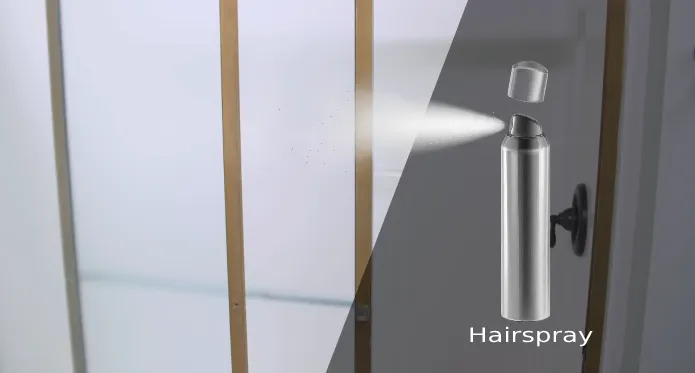Last Updated on March 6, 2023
Tired of unsightly white residue from hairspray buildup on your glass shower door? Don’t let it ruin the look of your bathroom. Hairspray buildup can quickly turn a sparkling bathroom into a dull, dingy mess. It’s not just unsightly, but it’s hard to get rid of if you don’t know how.
There are some simple and effective ways to help you remove the unwanted hairspray build-up on your glass shower door. Use white vinegar or baking soda paste to clean the grime naturally. Alternatively, a soft cloth or cotton pad coupled with isopropyl alcohol works effectively.
Below, we’ll walk you through several cleaning methods, from green alternatives to professional-grade products. And, of course, we’ll help you with tips and tricks to avoid a similar struggle in the future.
How to Clean Hairspray Off Glass Shower Door: Easily & Effectively
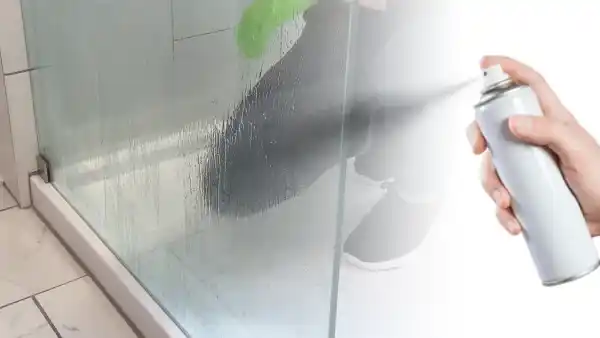
Cleaning off hairspray from glass shower doors can be a tedious task. Fortunately, there are natural and harsh ways to get the job done quickly and effectively:
Natural Way:
Natural ingredients are the simplest way to remove hairspray from shower doors, such as:

1. White Vinegar
White vinegar is a practical, natural way to remove hairspray from glass shower doors. To begin, try mixing equal parts white vinegar and water in a spray bottle. Shake the mixture thoroughly before spraying it onto the glass shower doors.
After a few minutes, wipe away the solution with a damp cloth or sponge. Use a soft-bristle brush to scrub away any remaining residue or buildup. After rinsing and drying, you can enjoy squeaky clean glass shower doors free of hairspray buildup.
For tougher buildup or soap scum, make a paste by combining white vinegar and baking soda with warm water. Use a soft cloth to apply this paste directly onto the affected glass areas and gently scrub until they’re gone. Thoroughly rinse and dry the area once you’ve finished cleaning.
2. Baking Soda Paste
Baking soda is another natural cleanser that can help remove hairspray from the glass shower doors easily. Start by creating a paste from water and baking soda in equal parts in a bowl until it reaches an even consistency like toothpaste. Add more baking soda as needed until you get the desired texture.
Apply this paste straight onto the stained area on your shower door using a soft cloth or brush, then let it sit for several minutes before wiping it away with damp cloth. This will help break down any tough hairspray buildup or grime accumulated on your glass door.
Rinse any leftover remnants with warm water and dry thoroughly with a microfiber cloth to avoid leaving any streaks while ensuring all residue has disappeared entirely. Doing so will leave your glass shower door sparkling clean without hinting at previous build-up.
Harsh Way:
For more stubborn stains, you may need to use harsher products like rubbing alcohol, acetone, or fabric softener.
1. Dish Soap
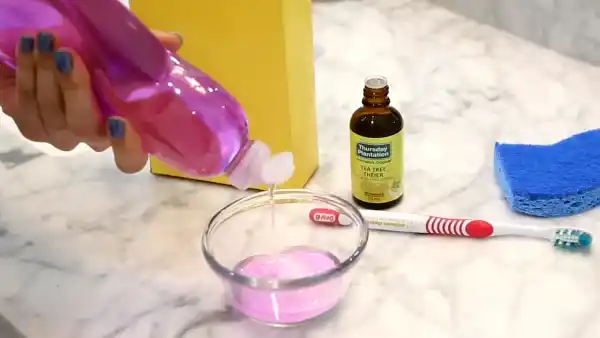
The first thing to do when cleaning your glass shower door to remove hairspray buildup is to get some dish soap. This is usually easy because most households have it in their kitchen cupboards. For best results, opt for a brand with no additives or fragrances so as not to leave any residue on the glass.
Start by squirting a small amount of the dish soap onto a dampened sponge or cloth and giving the glass shower door a gentle wipe. As you go, rinse off the sponge or cloth with warm water regularly, as this will help prevent residue from building up and do more work for yourself later on.
Once you’ve wiped away the excess hairspray and given the glass shower door an even coating of dish soap, let it sit for a few moments before rinsing it off completely with warm water.
2. Isopropyl Alcohol
Another effective way to clean hairspray off a glass shower door is isopropyl alcohol, also known as rubbing alcohol. To begin, pour some rubbing alcohol into a spray bottle and give the glass shower door a good spritz before using either a sponge or cloth to scrub hairspray residue gently.
Be sure to rinse your tools regularly while scrubbing, so no residue builds up, creating extra work for yourself afterward. Once you’ve finished scrubbing, spray the glass with warmer water and use either paper towels or microfiber cloths to dry it completely before moving on to the next step.
3. Fabric Softener
Fabric softener can be used as an alternative method for removing accumulated hairspray from a glass shower door because it helps dissolve the adhesive qualities of the hairspray, making it easier and quicker to remove without damaging your glass surfaces in any way.
Mix equal parts fabric softener and warm water into a bucket or container until thoroughly mixed before dipping your sponge or cloth. Then, wipe down your glass shower doors thoroughly with it in one direction only. This ensures that any grime or dirt left over after you’ve finished cleaning will be quickly visible instead of spread around unevenly.
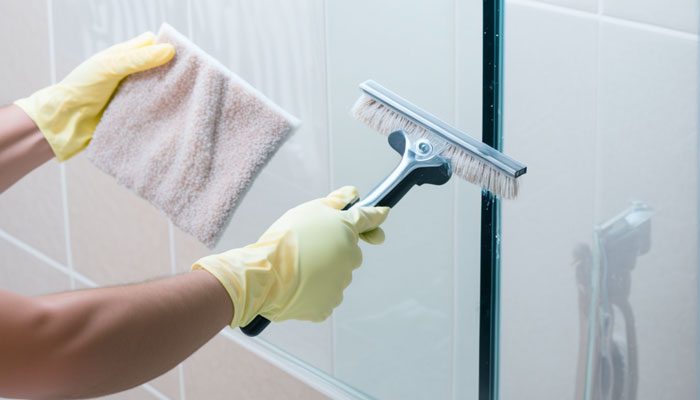
Once you’ve wiped down all surfaces, rinse them with plenty of warm water afterward to remove any traces of fabric softener that may have been left behind during your cleaning process.
4. Melamine Sponge
Consider using melamine sponges for an even deeper clean than what fabric softener can provide. These specially designed abrasive pads tackle tough stains caused by hard-to-remove products like hairspray.
Start by wetting one side of your melamine sponge before gently scrubbing over the affected area on your glass shower doors in circular motions until all residues are gone. Remember that these types of sponges should never be used too harshly as they could cause damage if pressed too hard against glass surfaces.
After scrubbing away all residues, make sure you rinse out your melamine sponges so that no particles remain inside. This will help keep them useful for future uses too.
Does Hairspray Leave a White Residue on the Glass Shower Door?
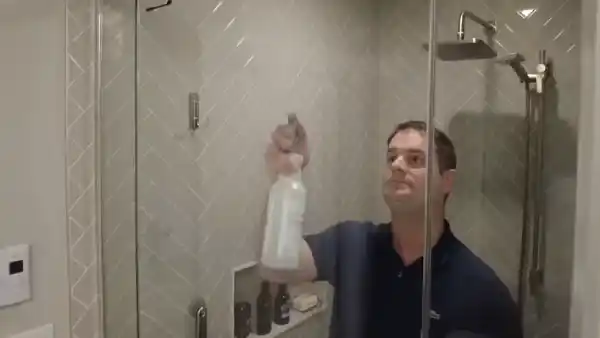
Yes, hairspray can leave a white residue streak on the glass shower door. This is because some brands of hairspray contain ingredients like alcohol, polyvinylpyrrolidone (PVP), and polymers that can be difficult to remove from any surface.
These substances can interact with minerals in hard water to form white deposits on the glass shower door. Also, when sprayed directly onto the glass surface, it can coat it with an invisible film that reacts to heat or light and leaves behind a white chalky residue.
The best way to prevent this is to spray hairspray on your hair at least 12 inches away from the glass door.
What Dissolves Dried Hairspray on a Glass Shower Door?
Fabric softener is one of the most effective solutions for dissolving dried hairspray left behind on a glass shower door. To begin, mix an equal part of the fabric softener with warm water, then apply it directly to the affected area.

After leaving it on for five minutes, use a sponge or cloth to gently rub away the softened hairspray until it disappears completely. Alternatively, you can use a mixture of equal parts distilled white vinegar and water as an effective alternative. When neither of these options works, you can use rubbing alcohol to remove stubborn stains.
Can You Use WD 40 to Clean Hairspray Buildup from the Glass Shower Door?
Yes, you can use WD-40 to remove hairspray grime buildup from a glass shower door. WD-40 is ideal for this purpose because it is designed to penetrate and dissolve stuck-on residue and grease while providing lubrication on the surface.
It is also safe to use on the glass as it contains no harsh chemicals or abrasive particles. Spray WD-40 directly onto the affected area and wipe it away with a damp cloth after a few minutes.
Will Acetone Damage a Glass Shower Door for Cleaning Hairspray Buildup?
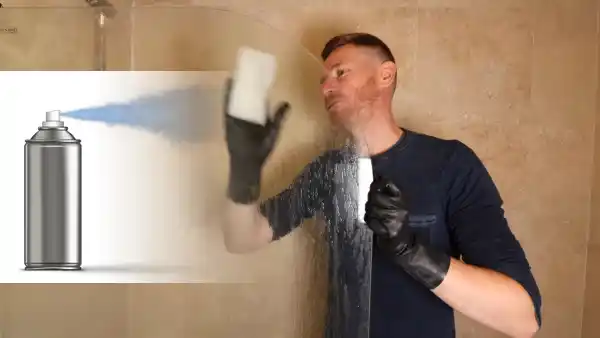
No, acetone will not damage a glass shower door when cleaning hairspray buildup. Acetone is a very effective solvent that can easily break down most synthetic materials, including plastic, latex, silicone, and more. But it will not harm glass surfaces due to its low reactivity rate with silicate compounds like those found in glass.
Acetone can remove hairspray buildup from a shower door, but use it carefully. Using too much may cause streaks or discoloration. It might also dry out the sealant around the edges of the door, causing cracks or chips over time.
How to Stop Hairspray Buildup in My Glass Shower Door?
Now and then, it’s almost inevitable that hairspray buildup will occur on your glass shower door. Thankfully, you can take a few simple steps to prevent the buildup from getting worse and keep your glass looking clean:

- Use a squeegee after each shower: After every shower, use a squeegee to wipe away any residue left behind by the hairspray. This is an easy way to get rid of residual hairspray so it won’t have time to build up on the glass over time.
- Invest in an anti-static spray: Anti-static sprays are designed explicitly for repelling dust and other particles from sticking onto surfaces, including glass shower doors. They’re great for keeping hairspray from adhering permanently and can be found at most home improvement stores.
- Dry mop regularly: Regularly dry mop your floor around the interior of your shower door, as this will help absorb any excess moisture that could cause hair product residue buildup over time if not taken care of properly. This simple step can go a long way toward preventing future buildup issues on your glass shower door.
- Use microfiber towels or sponges: Microfiber towels or sponges are soft enough to not scratch or damage the surface while cleaning. They are tough enough to remove any lingering residue from products like hair sprays or gels without leaving streaks behind.
Sparkle Shower Glass Doors by Cleaning Hairspray Residue
Several effective methods exist to remove hairspray residue from glass shower doors. The natural way involves soaking a cloth in a mixture of vinegar and warm water, gently wiping the door, and then rinsing it with clean water.
Alternatively, using fabric softener or WD-40 can help dissolve the hairspray buildup. For an even more aggressive approach, one could use acetone but handle it cautiously as it may cause damage to the glass if used excessively.
Ultimately, you must select the appropriate method for your specific situation to keep your shower door looking its best for years.

